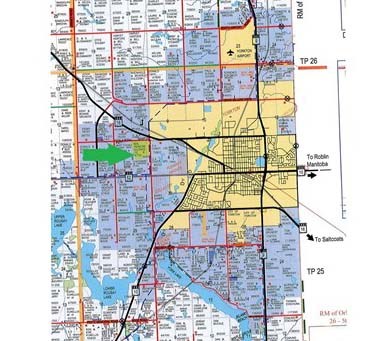“I represent my division and vote on decisions for the good of the whole municipality. You have to represent all of your ratepayers, not just some of them.”
— Councillor Vern Effa, RM of Orkney
There may be a showdown brewing as the reeve and council of the Regional Municipality of Orkney prepare to face ratepayers in a public meeting at 7 p.m. tonight (April 13) at the Royal Canadian Legion Hall in Yorkton.
In the 2012 election, discontented voters managed to replace Reeve Barclay Westerhaug and Division 1 councillor Donald Haacke with Reeve Dale Rhinas and councillor Gordon Rhinas.
The contention of a group of residents of Division 1 (there are six), specifically some ratepayers in the Collacott and Pleasant Hill subdivisions, was that they were not getting adequate service for the taxes they were paying.
At the time, they listed, through spokesperson Lori McCallum, a number of complaints including lack of policing, sidewalks, streetlights, fire hydrants, pathways and parks, but particularly the state of their roads and inadequate dust control.
During that election, Westerhaug said what the residents were demanding was simply not in the budget and suggested a local improvement levy. Rhinas promised to be more responsive, but did not commit to specifics saying he would not know what could be done until he took office.
As the 2016 election approaches, not much has changed according to McCallum. In a letter received by Yorkton This Week, she said the reeve and Councillor Rhinas have been responsive to their demands and have pushed the agenda forward to Council, but are routinely voted down by the other five councillors.
The main issue, she said, is road maintenance, specifically gravel application and dust control.
McCallum and others suggest that although their division, which is more densely populated, provides more than half the tax revenue for the R.M., they do not get equitable services.
Clint Mauthe, the R.M. administrator confirmed more than half the tax revenue comes from Division 1, but more than half of that comes from commercial property in the division, he explained, primarily the large industrial operations of Richardson Oilseed and P&H.
In 2015, Orkney spent more than $500,000 on road improvements in Division 1, mostly for Grain Millers and York Roads.
The total tax levy for 2015 was $1.86 million, $594,000 of which was commercial. Spending on roads across the R.M. accounted for more than a third of the overall budget of $3.3 million.
Mauthe said the books are in order and all the divisions receive road maintenance according to their needs within the constraints of the budget.
He also noted, the Division 1 subdivisions are getting streetlights currently.
Suspicions abound, however, largely because of a lack of communication between Council and ratepayers, Reeve Rhinas suggested. He characterized the conflict as an urban-rural split.
He said he has been pushing for regular ratepayers meetings since he was elected three-and-a-half years ago, but the majority on council have refused since the last one in 2013. They finally conceded at the most recent R.M. Council meeting, but passed a motion they would not answer questions from the floor.
The reeve said despite the motion he would stick around and answer questions.
“I can’t accept that,” he said. “At this point, I don’t know what the other councillors will do.”
Division 5 councillor Vern Effa sees it diffently. He said it is perfectly reasonable not to entertain questions at a public meeting, citing advice from other R.M.s that do the same.
The bottom line, he said, is people want information and information is what they will get at the meeting tonight. He added people are welcome to submit written questions, which Council will deal with at the board table.
As to why previous ratepayer meetings may have been voted down, Effa said the councillors had their reasons, not the least of which, in 2014, was because they had just changed administrators and wanted to give him the chance to get comfortable in the job.
“I represent my division and vote on decisions for the good of the whole municipality,” he said. “You have to represent all of your ratepayers, not just some of them.”



